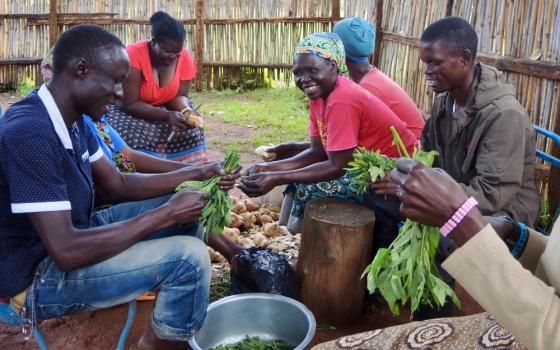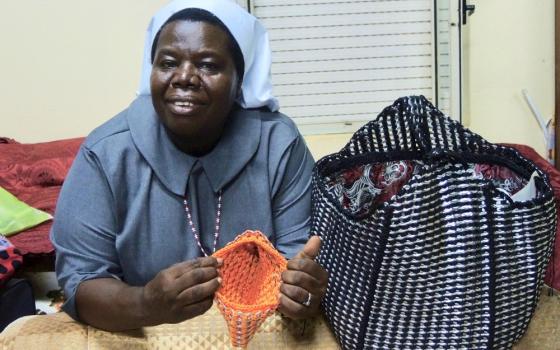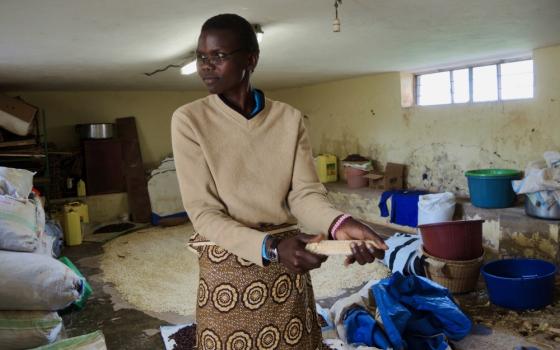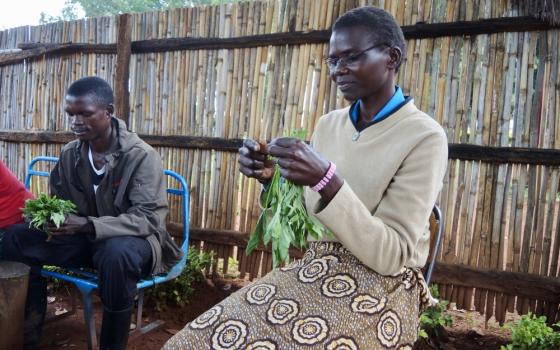On a sunny day last January, the St. Monica's Vocational School for Girls in Gulu, Uganda, was full to bursting. More than 5,000 people covered every inch of the verdant campus, celebrating the Gulu Episcopal Provincial Annual Peace Prayer Week, which culminated Jan. 13, 2017, with a celebratory Mass.
"May each heart not promote violence! May each mouth not promote violence!" The words of Msgr. John Baptist Odama, archbishop of Gulu, echoed across the school grounds.
Two decades ago, Joseph Kony's Lord's Resistance Army stormed St. Monica's with guns firing, searching for children they could coerce to be new soldiers. But on this day in January 2017, the bullet holes that still pepper the ceiling of the classrooms were contrasted against thousands of people outside, clasping their hands in a prayer for peace.
Sitting among the crowd was Sr. Rosemary Nyirumbe, the former director of St. Monica's school.
"I was very observant, and one thing I noticed was that not a single woman or religious nun was able to give a voice [during peace week]," said Nyirumbe. "They didn't even invite one! When we're talking about peace building, I expected them to say, 'Let's take some of these women who were deeply affected by this conflict to give their voice, to find out how they are involved in peace building, what their roles are.'"
As a result of the male-dominated peace week, Nyirumbe decided to gather some women in Gulu to create their own peace forum. "We women should give a voice to ourselves, why are we waiting for other people?" she asked.
Pope Francis marks World Day of Peace on Jan. 1, offering a vision for a more peaceful world in the coming year, a message Nyirumbe hopes women will take to heart.
Nyirumbe is also overseeing an effort to write a women-specific "peace curriculum" with survivors of northern Uganda's years of terror. The curriculum will use real-life examples and methods that have helped women in Gulu, teaching women in other post-conflict areas how to find peace both within themselves and within their communities.
Nyirumbe says peace building requires a two-pronged approach: Women must achieve financial independence through both formal schooling and practical skills training; these lead them to a sense of empowerment well beyond subsistence survival. Then the real healing can begin. The women must forgive themselves and find calmness within before they can turn outward and begin to heal the rifts in their society, she says.
Bullet holes in the ceiling
St. Monica's, like much of northern Uganda, still bears the physical scars of the years of unrest. Starting in 1989, more than 30,000 children, both boys and girls, were kidnapped in northern Uganda and forced to commit atrocities against their own villages in the 25-year war led by Kony.
Kony, a self-described prophet bent on overthrowing Uganda's longtime president, Yoweri Museveni, instructed his followers to kidnap children as young as 8, brainwash them and force them to burn down homes and rape and kill their neighbors. The violence displaced more than 2.5 million people in northern Uganda and left 100,000 people dead.
Children called "night commuters" crowded into the hallways of St. Monica's each evening, walking miles each day to have a safe space to sleep, hiding from the kidnappers.
The Lord's Resistance Army eventually crumbled into disarray as the kidnapped children escaped, and the war petered to a halt. The International Criminal Court issued a warrant for Kony in 2005, and the Ugandan government attempted to negotiate for peace starting in 2008. President Barack Obama sent special forces troops in 2012 to try to capture Kony in cooperation with the Ugandan army. The Department of Defense spent $780 million over six years in pursuit of Kony, though the operation ended last spring without Kony's capture.
With his army weakened to only a few hundred fighters, Kony withdrew from northern Uganda years ago and is now believed to be in hiding in the Central African Republic, Sudan or the Democratic Republic of Congo.
As the conflict ended and the kidnapped children emerged from the bush, they had to return to the same villages they had pillaged. Many communities shunned the returnees, because the children's presence was a reminder of the things they did and people they killed, a reminder of impossible loss. The process of reconciliation, some of which uses religious leaders to conduct traditional tribal forgiveness ceremonies, is ongoing.
Girls faced an even greater challenge than boys in the process of rebuilding a life after the conflict. Many girls were forcibly "married" to rebel army commanders, and they returned to their village with young children. The girls had barely completed elementary school and were now single mothers with no education or social support because their families shunned them.
When the first waves of female returnees came back home, the Sacred Heart of Jesus sisters, who have run St. Monica's since 1982, adapted their vocational program for young mothers. They started a nursery school and kindergarten so mothers could study, and they offered literacy programs for girls who had left school so early they could not read. They incorporated therapy into their traditional vocational training in agriculture, weaving, catering and tailoring.
More than 1,500 girls and women have graduated from the various courses, which range from three months to two years.
Nyirumbe said it was a change for the sisters to begin to accept unmarried mothers to study at the school. "But we said, 'Where is our compassion? Where is our care? Our care is to embrace both the mother and the child,' " she said.
As the years passed, many St. Monica graduates have found success: They started their own stores, began to reconcile with their family and neighbors, got married, had more children. "You can see a girl 10 years ago, she was so miserable, deeply traumatized, and I see her now very beautiful and well dressed," said Nyirumbe. "I see these people have walked through their own pain, they took ownership and they are totally transformed."
Once Nyirumbe, who gives speeches and interviews about St. Monica's around the world, ran into one of her graduates in Ethiopia's Addis Ababa airport. The graduate was returning from a women's conference in Egypt, where she was an invited speaker. "She wasn't [formally] educated, but she's getting that freedom to go out and talk in the name of others," Nyirumbe said.
A group of St. Monica's alumni started the Women's Network, an independent group of women who offer small-scale bank loans and emotional support.
Josephine Amena, a graduate of St. Monica's who now works at the school, is one of the members of the group and said the financial independence she gained after learning to sew has allowed her to "stand firm."
"Sometimes I'll be defeated, but [after my training] I won't need to go begging to people," she said.
Amena accompanied Nyirumbe to Washington, D.C., in 2016 for the National Prayer Breakfast and spoke to a breakout session. Instead of focusing on the difficulties, her kidnapping and survival in Kony's army, or her family's rejection when she returned home, Amena prefers to talk about prayer.
"I told them that God has relieved me from the bush to continue with life," she said.
Amena relied heavily on her prayer group, made up of both ex-soldiers and civilian victims of terror, to help her find inner peace. "I always tell my fellow ladies, 'Stand firm, there are problems all over the world; there is nowhere where people aren't suffering. Even if I'm sleeping hungry, wherever I go, when you have that peace of heart you're not alone,' " said Amena. "Peace starts from the inside, and then you have more outside."
How do you teach peace?
"You cannot teach peace," said Nyirumbe. "You have to lead and see it done practically. The people who suffered so much are the very ones who can become teachers of peace."
Nyirumbe is overseeing the creation of the Transformative Peace Education curriculum, part of a partnership with the University of Oklahoma's Center for Peace and Development. There are already many blueprints for peace education curriculums across the world. But Nyirumbe is giving the survivors, not academics, the responsibility for designing the program.
"We're involving people who went through that past and they can tell the story using their own example," said Nyirumbe.
One lesson they plan to include in the curriculum is a photo project where the women create three photos that represent their past, present and future. "Pictures and storytelling are very good for these women," said Nyirumbe. "It encourages them not exactly to forget the painful past but to remember it and be able to talk about it now, and keep it as a point of reference to teach their children. To say to them, 'This is what we went through so I will take care of you and I won't let you go through this,' " she said.
Nyirumbe said she remembers hearing traditional stories from her mother, including the stories about two brothers from the Luo tribe who kept fighting. To this day, she still hears her mother's voice echoing in her ear with the moral of that story, warning her never to take revenge. "It is women who can tell these stories effectively to the children, who can say, 'You must break the cycle of violence.' Children spend so much time with their mothers," she said.
Nirumbe says many women are cowed by their culture or lack of education.
"Education will liberate these women from their servitude, from their psychological slavery, from their psychological torture and mental torture because they cannot speak about the past. I know there are many things that hold them as captives, and one of them is lack of education. Once they are able to write and speak and communicate, they are no longer living in that prison."
Pennies and peace
The curriculum will give women around the world practical tools for emerging from trauma and conflict toward personal healing and then doing peacemaking on a larger scale.
First, there's the practical part of making peace, which is making money. More than anything, these women know you can't pray on an empty stomach. In conflict areas beset by widespread poverty, the first thing is to ensure the women have a way to survive.
Amena and her friends, assisted by St. Monica's, created small groups of "table banking," or informal micro loan groups in their communities, to set up small businesses or shops using the skills they learned at St. Monica's.
"You should always try to save a little money, because the world is like a ball," said Amena, and you never know which way fate will roll. "If you think, 'people will help me out,' that is out. You have to stand firm and say, 'What I'm doing is not only for my benefit but also for my children.'"
Then comes the emotional work.
Amena said in the early years, after her family rejected her and she was struggling to survive as a single mom, people often told her to forget the past and move forward. "But I've seen these things with my own eyes," she said.
Instead, it took years of counseling and community prayer groups to address the trauma she went through and begin to heal. There is a pattern towards healing, one Amena and her friends will try to crystalize into part of the peace curriculum.
"Forgiving people is part of it, you must have a heart of forgiveness," she said. One aspect of that forgiveness also focuses internally.
"You must have peace of mind, peace of heart, peace of body," said Amena. "In families where there is no peace, life will be hard. People will be quarreling all the time. When you have peace of mind, it also helps the family to live in peace."
It, too, is important to create a community of people dedicated towards the same goal of healing.
"When life becomes hard, you can say, 'I have no one,' it can be hard to share or ask for help," said Amena. "I live and work with these people, and when I'm stuck with life they understand."
Nyirumbe and the University of Oklahoma believe that people around the world will also learn and understand, gaining insight from the lessons these women have gleaned.
"We are working with them, but we are making them become the advocates," said Nyirumbe. "They should find other women and say, 'If we can do this, then you can reach it, too.' "
Uganda now hosts more than a million South Sudanese refugees, who have been through their own traumas and need the same support and assistance.
"Someone can't come and tell you to have peace in your heart and mind," said Amena. "It depends on the way you live with people, what you do to people, and the life you're going through."
As Pope Francis reminds the world to pray for peace on Jan. 1, Nyirumbe hopes the message of the women of northern Uganda will also reach forgotten corners of the world where conflicts are just beginning to fade and wounds are still fresh.
"Peace is not just the absence of war, it's also the peace of the heart," said Nyirumbe. "And if we can get people to start living and feeling from their heart that they're in peace, then development can start taking place. Without this, we will work in vain."
[Melanie Lidman is Middle East and Africa correspondent for Global Sisters Report based in Israel.]
Read Global Sisters Report's previous coverage of making peace in northern Uganda with articles about St. Monica's and traditional healing ceremonies.




